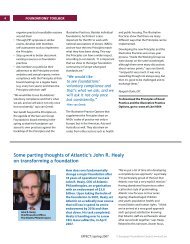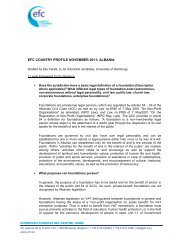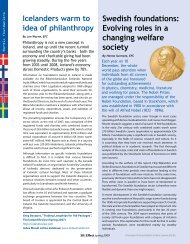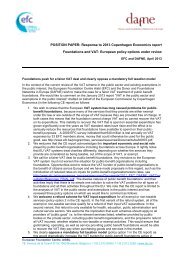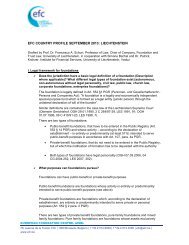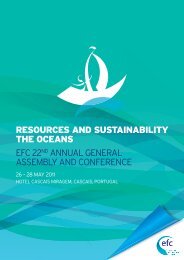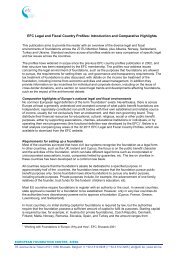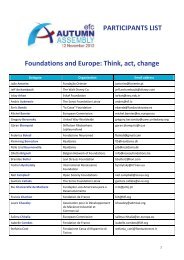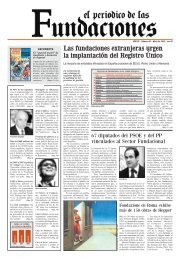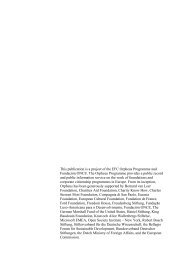European perspectives on global health: a policy glossary
European perspectives on global health: a policy glossary
European perspectives on global health: a policy glossary
Create successful ePaper yourself
Turn your PDF publications into a flip-book with our unique Google optimized e-Paper software.
2. Europe must include <strong>global</strong> <strong>health</strong> in all fields of <strong>policy</strong><br />
compulsory licensing, parallel imports and other<br />
excepti<strong>on</strong>s to exclusive patent rights. In this manner,<br />
the provisi<strong>on</strong>s in the TRIPS Agreement may be used<br />
to strike an appropriate balance between creating<br />
incentives for innovati<strong>on</strong>s, and the need for access to<br />
technology and informati<strong>on</strong>.<br />
Although it was generally acknowledged that the<br />
TRIPS Agreement c<strong>on</strong>tained sufficient flexibility to<br />
permit implementati<strong>on</strong> c<strong>on</strong>sistent with public <strong>health</strong><br />
, developing countries faced difficulties in their<br />
attempts to implement safeguards such as parallel<br />
imports and compulsory licensing in their domestic<br />
legislati<strong>on</strong>. The legal challenge by the pharmaceutical<br />
industry of a provisi<strong>on</strong> that enabled parallel imports<br />
in South Africa’s Medicines and Related Substances<br />
Amendment Act ( Act No. 90 of 1997 ) and the USinitiated<br />
complaint against Brazil in the WTO dispute<br />
settlement system over a provisi<strong>on</strong> in the Brazilian<br />
domestic legislati<strong>on</strong> <strong>on</strong> compulsory licensing, were<br />
two of the better-known cases that prompted<br />
developing countries to demand a clarificati<strong>on</strong> in the<br />
WTO.<br />
The interpretati<strong>on</strong> and scope of the flexibilities in<br />
the Agreement and the use of these flexibilities to<br />
improve access to essential medicines were the<br />
main source of debate, which culminated in the<br />
adopti<strong>on</strong> of the Doha Declarati<strong>on</strong> <strong>on</strong> the TRIPS<br />
Agreement and Public Health. This declarati<strong>on</strong><br />
clarified that countries were within their rights to<br />
make use of measures, such as compulsory licensing<br />
and parallel imports, for public <strong>health</strong> purposes<br />
and to ensure access to medicines. Compulsory<br />
licensing, for instance, would allow countries to<br />
enable generic producti<strong>on</strong> of new products, and thus<br />
create the necessary pressures for price competiti<strong>on</strong>.<br />
Equally important, WTO Members, in singling out<br />
pharmaceutical products for special treatment, have<br />
also recognised that <strong>health</strong> products need to be<br />
treated differently in certain circumstances. The Doha<br />
Declarati<strong>on</strong> thus represents an agreement between<br />
WTO Members that public <strong>health</strong> c<strong>on</strong>siderati<strong>on</strong>s<br />
should c<strong>on</strong>diti<strong>on</strong> the extent to which patent protecti<strong>on</strong><br />
is implemented.<br />
The EU and its Member States played an active role<br />
in Doha discussi<strong>on</strong>s c<strong>on</strong>cerning access to medicines.<br />
The proposal which it put forward would have taken<br />
a broader view of <strong>health</strong> needs providing access to a<br />
range of drugs and not just those defined as meeting<br />
the needs of specific medical emergency c<strong>on</strong>diti<strong>on</strong>s.<br />
The declarati<strong>on</strong> represented a compromise reached<br />
with the US which had demanded more stringent<br />
c<strong>on</strong>trols <strong>on</strong> intellectual property rights.<br />
However, the Doha Declarati<strong>on</strong> had left <strong>on</strong>e issue<br />
unresolved. In Paragraph 6, the Doha Declarati<strong>on</strong><br />
had recognised that developing countries without<br />
manufacturing capacity would face difficulties in<br />
making effective use of compulsory licensing. Since<br />
the TRIPS provisi<strong>on</strong> restricts exports of products<br />
manufactured under compulsory licence, countries<br />
without manufacturing capacity dependent <strong>on</strong> foreign<br />
generic producers would have a problem sourcing<br />
adequate supplies of generic medicines produced<br />
under compulsory licence. To resolve this problem, the<br />
WTO General Council Decisi<strong>on</strong> <strong>on</strong> the Implementati<strong>on</strong><br />
of Paragraph 6 of the Doha Declarati<strong>on</strong> <strong>on</strong> TRIPS<br />
and Public Health established a system to permit<br />
the producti<strong>on</strong> and export of generic versi<strong>on</strong>s of<br />
patented medicines by waiving the restricti<strong>on</strong> <strong>on</strong><br />
exports under compulsory licence. The system permits<br />
countries wishing to import generic medicines, to do<br />
so from a foreign producer under certain c<strong>on</strong>diti<strong>on</strong>s<br />
of eligibility and notificati<strong>on</strong> of the TRIPS Council.<br />
Members recently agreed to c<strong>on</strong>vert the WTO Decisi<strong>on</strong><br />
<strong>on</strong> Paragraph 6 into an amendment of the TRIPS<br />
Agreement.<br />
The TRIPS Agreement, the Doha Declarati<strong>on</strong> and the<br />
WTO Decisi<strong>on</strong> <strong>on</strong> Paragraph 6 ( and subsequently,<br />
the amendment of the TRIPS Agreement when it<br />
comes into effect ), now collectively comprise the<br />
internati<strong>on</strong>al legal framework governing the rights of<br />
countries to take measures to protect public <strong>health</strong>.<br />
Since intellectual property rights are territorial and<br />
governed by domestic laws, it will be necessary<br />
for specific provisi<strong>on</strong>s, where n<strong>on</strong>e exists, to be<br />
effectively enacted in domestic law to enable their use<br />
within each country. For this reas<strong>on</strong>, it is important<br />
for countries to implement the TRIPS flexibilities<br />
appropriately within their domestic legislati<strong>on</strong>.<br />
The GATS may be applied to the internati<strong>on</strong>al<br />
trade in <strong>health</strong> services, including <strong>health</strong> insurance<br />
and <strong>health</strong> care provisi<strong>on</strong>. The definiti<strong>on</strong> of trade<br />
in services in the Agreement hinges <strong>on</strong> four types<br />
of transacti<strong>on</strong>s or “modes of supply”, namely : the<br />
cross-border supply of services ( e.g., telemedicine,<br />
Global Health Policy Glossary<br />
29



